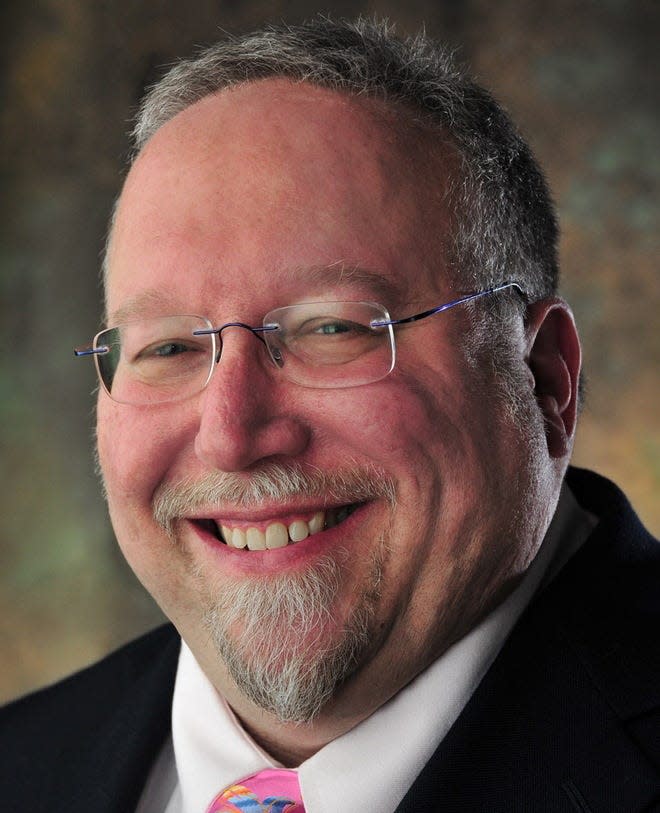Two candidates vying for Waukesha County District 18 seat acknowledge tough budget choices
WAUKESHA - In the realm of Waukesha County Board's District 18, any discussion about the candidates for office can't fully separate itself from issues that pertain to Waukesha, the city.
But the county supervisor's seat is also couched in the middle of some heady Waukesha County issues, particularly a growing concern about a government budget that faces the kind of challenge not typical in this realm: a crisis of spending far exceeding expected revenues. Now add a dose of societal problems, such as opioid addiction.
For the incumbent, Larry Nelson, these are problems he has already had to face. For his challenger, Thomas Harland, it's all worthy of campaign talk, but with an acknowledgement that earning the job means he, too, will have to find answers to tough questions.
It's voters who will decide during the April 2 spring elections who should deal with the tasks.
Both candidates will appear on the April 2 ballots for the district. Here's the map on the county's website showing the odd-shaped district's borders.
Here's a bio summary of the candidates.

Thomas Harland
Age: 35 (born 1988)
Occupation: Director of Operations at LKQ Corporation
Political experience: None
Endorsements and paid support (if any): WisRed, or the Republican Party of Waukesha County
Contact information (including websites): harlandforwaukesha.com, LinkedIn: www.linkedin.com/in/thomas-harland-1b954812/, Facebook: www.facebook.com/profile.php?id=61556234604272

Larry Nelson (incumbent)
Age: 69 (born 1955)
Occupation: Retired English Teacher and Waukesha County Supervisor
Political Experience: Waukesha alderman (2000-2006), Waukesha mayor (2006-2010), Waukesha County supervisor (2012-present)
Endorsements & paid support: None
Contact information (including websites): larrynelsonforsupervisor.com, Facebook: https://www.facebook.com/larrynelsonforsupervisor/https://www.facebook.com/larrynelsonforsupervisor/
Waukesha concerns include west bypass, road safety and drug use
Unlike many of the county board supervisory seats, District 18 doesn't cover a vast territory. It's a city-laden district covering the southcentral and southwest parts of Waukesha, with a mix of century-old, rectangle-grid neighborhoods and curly mid-century, twisting subdivisions from the city's later rapid-growth era.
The West Waukesha Bypass, the major initiative that extended Les Paul Parkway to create a looping highway route to more allow more free-flowing traffic, is a major component in the district. Both candidates have something to say about the road, which became the new alignment of U.S. Highway 18 in Waukesha.
Nelson, who served as Waukesha mayor for four years during its later planning stages, noted his role predates his election to the county board. It's one of the points that demonstrates his dedication to district concerns, he said.
"I was proud to vote to complete the West Bypass which goes through the southern part of District 18 which was first proposed in 1958," Nelson said.
"I negotiated with former County Executive Vrakas and the Wisconsin Department of Transportation on the agreement that led to the bypass in 2009 when I was mayor. It allows traffic to move southeast and southwest much more quickly and safer than before."
But Harland noted that the busy route also has presented a new problem that must be dealt with accordingly.
"An issue that I see on a frequent basis is traffic accidents at the intersection of Highway 59 and Highway X," Harland said. "Since the west bypass was completed, this intersection has seen more than its fair share of collisions. As this portion of Waukesha is primed for further development, we will need to ensure that any increase in traffic at this intersection transpires in a manner that protects motorists."
Nelson said traffic concerns also extend to pedestrians at River Road and Rivers Crossing Drive, which is used frequently by Waukesha West High School students. He said he will continue to work with the city and county officials to consider safety enhancements there.
Both Harland and Nelson support county mental health and drug programs
Public safety should also extend to drug use, Harland said. The opioid crisis is the most immediate concern and will require partnerships, he said.
"Drug related deaths have been the leading non-natural cause of 18- to 45-year-olds in Waukesha County," he said. "The County Board has been pursuing various avenues to address the opioid epidemic but we will continue to see these issues as economic conditions continue to deteriorate. The opioid epidemic cannot be solved by the County Board alone and we need to work with state and federal agencies to reduce the flow these substances into our communities."
Nelson said drug overdoses were part of March 14 launch of the county's Community Health Improvement Plan, which also address mental health and "healthy aging" among its planning initiatives. Mental health concerns were among his priorities, he added. But he has had a hand the drug element, too.
"I’m also proud to be the Waukesha County Heroin Task Force Co-Chair, whose mission is working together to break the cycle of substance use through community action and hope, whose work has helped reduce overdose deaths," he said.
Waukesha County's 2025 budget will require tough decisions
Regardless of personal priorities, county supervisors will face a daunting task for the next fiscal year beginning Jan. 1, thanks to a short-term revenue source that will no longer be available.
The county used American Rescue Plan Act funds from 2021 federal legislation to boost its own budget, including in some cases money to retain employees. But the revenue will not carry into 2025, leaving supervisors, along with the county executive, to set priorities and sacrifice something.
For Harland, it's not a decision that's far removed from private-sector challenges.
"In my 15 years within business operations, this is a familiar situation where an organization needs to reconcile raising wage costs with a limited ability to increase incoming funds," Harland said. "Waukesha County will have to make difficult decisions to reduce programs that may cost more than what can be supported."
One idea foremost is his mind is that the county should commit to running its recreational facilities in a manner that doesn't drag down the overall budget. Harland noted that the county was smart enough to self off its money-losing Wanaki Golf Course in Menomonee Falls in 2020. But the Eble and Naga-Waukee ice centers still operate at a loss, he noted.
"One method to reduce these deficits would be to look at increasing the fees associated to use the facilities like ice access and skate rentals," he said. "Another method would be to aggressively sell sponsorships at the facilities including on ice opportunities or even naming rights for the arenas."
Philosophically, Harland said he doesn't believe the county should subsidize such operations when the private sector has similar facilities with no public funding.
Nelson — who praised county officials' use of ARPA funds to clear a backlog of courtroom cases caused by the COVID-19 pandemic, renovate the 65-year-old courthouse and beef up its health department — said the county is already on a path toward setting priorities, but in a comprehensive manner.
"I’m totally supportive of the County Executive’s plan to create a Budget Task Force, which will study our future capital and operating needs, go over all available revenue options, and eventually make recommendations to how we should approach our budgets over the next five to 10 years," Nelson said. "Two years ago I was honored to be elected to the Executive Committee and am looking forward to our March meeting where this task force idea will be presented.
Regardless, he stands behind the county's track record of containing costs and watching tax dollars closely. "I’m proud to have voted for 12 budgets that have kept Waukesha County with the second lowest county tax rate in Wisconsin and a AAA bond rating, saving taxpayers hundreds of thousands of dollars," Nelson said.
Candidates differ on partisan influences in nonpartisan races
When county supervisors appear on ballots, there is no party designation after their names.
But nonpartisan elections have increasingly involved some sort of party backing, especially for school board races since 2022. The support generally comes in the form of campaign backing, sometimes financially.
Harland acknowledges his backing by county Republicans, under the party's WisRed initiative. Nelson, who has in the past publicly acknowledged himself as a Democrat, says he has kept party backing at arm's length for his county board campaign. They differ on the value, or wisdom, of party roles for such races.
"In an ideal world, all races would be nonpartisan across all levels of politics," Harland said. "We can look back to George Washington’s Farewell Address where he speaks to the dangers of political parties as they would seek to dominate one another or revenge for actions of the other party."
But the reality of present-day races, even for the Waukesha County Board, is that "partisan pressures" are in play, he added. "More often than not, candidates in today’s world who are outside of the partisan scope are dismissed as not being legitimate," Harland said.
WisRed helps Harland's campaign by connecting him for volunteers to assist him.
"I feel comfortable with this approach and feel that many would agree that if we can move towards nonpartisan races supported by partisan groups it would be a step in the right direction," he said.
Nelson, by contrast, sees partisan influences as causing a divide, a concern that has generated "complaints across the political spectrum," he said.
"I believe the reason local government in Wisconsin is more effective and efficient is because we’re non-partisan, unlike Illinois," Nelson said.
However, in-kind contributions, defined as non-monetary contributions, as part of a campaign are acceptable, as long as a candidate's campaign literature doesn't list a party affiliation. His own literature — in past campaigns for Waukesha alderman and mayor as well as for county board supervisor — has always listed that it has been paid for by Friends of Larry Nelson.
How much government remains an open question in Waukesha County
The two candidates also don't see eye to eye on when government should extend itself into other public concerns. Both noted how one initiative reflects on that idea.
"Voters don’t want to continue to shoulder the burden of a growing government," Harland said. "Larry has spent over a decade in the county government and has rarely faced a challenger. This district is looking for a change in representation and I am bringing in fresh ideas with a business approach. Larry has been very outspoken on ways he has grown the government including a new Crisis Stabilization Center."
Nelson stands behind his own management approach, including the Crisis Stabilization Center, where residents can come to get voluntary help with mental health issues, including depression, drug and alcohol misuse and potential self-harm.
The program addresses a need that offsets current societal concerns, including in Waukesha County, he said.
Contact reporter Jim Riccioli at [email protected].
This article originally appeared on Milwaukee Journal Sentinel: Waukesha County District 18 supervisor candidates have differences
